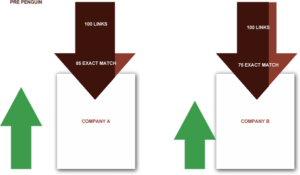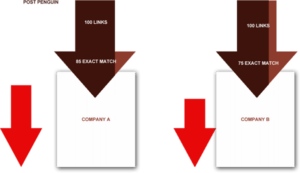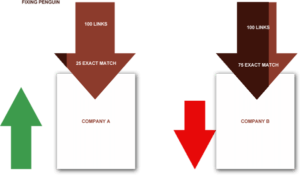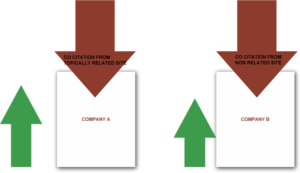What a crazy year 2012 was for SEO. Penguins and pandas falling from the sky certainly kept SEO and search engine marketers on their toes. With all the volatility in the search engine industry, how do you stay current and ahead of the curve so clients don’t suffer from the latest Google algorithm change? How do you know what works best? Where is the SEO industry headed? Here are some of our thoughts.
Anchor Text and Pre-Penguin
In many ways, 2013 was not the death of SEO, but the death of anchor text. Not too long ago anchor text was how you ranked a website. Let’s look at a simple illustration. Say we have two separate sites that are trying to rank for the same phrase; Denver SEO. Keeping all things equal, Company A has 100 links pointing to it and Company B also has 100 links pointing to it. The only difference in this scenario is that Company A has 85 links that have the exact match anchor text of Denver SEO and Company B has 75 links with the exact match anchor text of Denver SEO. Pre penguin, Company A most likely would obtain the higher ranking.

Post-Penguin
Penguin was a Google algorithm change that targeted over-optimization. Within this update, exact match anchor text was penalized when used too frequently. Looking at our model, Company A would be penalized more than company B and Company A would lose more rankings.

Penguin FIX
In order to correct the harm done by anchor text over-optimization, there should be below 50% exact match anchor text, and in many cases, far far less. In this example, if company A decreased the amount of anchor text with the exact match phrase of Denver SEO, they would slowly regain their rankings.

CO-Citations and the Future of SEO
Co-Citation
Recently Rand Fishkin, former owner of Moz, predicted Google was moving towards co-citation. Co-citation is basically link building without the links. Sounds sort of odd, I know. The concept is essential there is an article written that mentions your keywords (or topics) and references your company but does not necessarily provide a link to your site with anchor text. For example: “David McBee is a Rockstar SEO dude”. Notice how there is no link going to McBee’s site? Google is smart enough to recognize the “linkless” citation and give or pass link credit to his site.
The relevancy of the site your content is being placed on is also going to play an important role. When content is placed on a site relevant to your industry, your rankings will increase quicker and more drastically. When content is placed on less relevant or non-relevant sites, the increase in rankings will develop at a slower pace and less dramatically.

Co-citation is simply a new form of link building to add to the mix!
The Future of SEO
SEO is not dying, it is being refined and improved. Google will always be looking for ways to improve its search engine and increase its bottom line. As Google continues to evolve, the basics of SEO will stay relatively constant: quality content and some equivalent of link building or citation.


